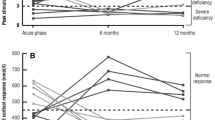Abstract
It is now widely accepted that brain injuries are often the cause of acquired hypopituitarism in adulthood. The information about the pituitary function in brain-injured children and adolescence is however scanty. An international workshop entitled “Traumatic brain injury and hypopituitarism” was held on 9–10 April 2006 in Granada, Spain, in order to explore the relatively unknown but potentially important field of investigation, diagnosis and treatment of pituitary deficiency in children and adolescents following traumatic brain injury (TBI). The following conclusions were reached: 1) a prospective pediatric and adolescent study of pituitary function was indicated; 2) close collaboration among neurosurgeons, neurologists, rehabilitation specialists and pediatric endocrinologists, with support from adult endocrinologists, is essential to achieve a coordinated approach to the care of children after TBI; 3) a model of interaction, similar to that now existing with oncologists, needs to be established; 4) a “pediatric TBI late-effects” service should be created, preferably led by endocrinologists, so that knowledge of growth and puberty can be included, in order to optimize identification, investigation and treatment of this important group of patients.
Similar content being viewed by others
References
Leon-Carrion J, Dominguez-Moralez MR, Barroso y Martin JM, Murillo-Cabezas F. Epidemiology of traumatic brain injury and subarachnoid haemorrhage. Pituitary 2006, 8: 197–202.
Bonnefont X, Lacampagne A, Sanchez-Hormigo A, et al. Revealing the large-scale network organization of growth hormone-secreting cells. Proc Natl Acad Sci U S A 2005, 102: 16880–5.
Ghigo E, Masel B, Aimaretti G, et al. Consensus guidelines on screening for hypopituitarism following traumatic brain injury. Brain Inj 2005, 19: 711–24.
Popovic V, Aimaretti G, Casanueva FF, Ghigo E. Hypopituitarism following traumatic brain injury. Growth Horm IGF Res 2005, 15: 177–84.
Masel BE. Traumatic brain injury induced hypopituitarism: The need and hope of rehabilitation. Pituitary 2006, 8: 263–6.
Schneider HJ, Schneider M, Saller B, et al. Eur J Endocrinol 2006, 154: 259–65.
Agha A, Rogers B, Sherlock M, et al. Anterior pituitary dysfunction in survivors of traumatic brain injury. J Clin Endocrinol Metab 2004, 89: 4929–36.
Lieberman SA, Oberoi AL, Gilkison CR, Masel B, Urban RJ. Prevalence of neuroendocrine dysfunction in patients recovering from traumatic brain injury. J Clin Endocrinol Metab 2001, 86: 2752–6.
Kestimur F. Chronic trauma in sports as a cause of hypopituitarism. Pituitary 2005, 8: 259–62.
Miller WL, Kaplan SL, Grumbach MM. Child abuse as a cause of post-traumatic hypopituitarism. N Engl J Med 1980, 302: 724–8.
Benvenga S, Campenni A, Ruggeri RM, Trimarchi F. Hypopituitarism secondary to head trauma. J Clin Endocrinol Metab 2000, 85: 1353–61.
Barbeau C, Jouret B, Gallegos D, et al. Syndrome d’interruption de la tige pituitarire. Arch Pédiatr 1998, 5: 274–9.
Aimaretti G, Ambrosio MR, Di Somma C, et al. Residual pituitary function after brain-injury induced hypopituitarism: a prospective 12 month study. J Clin Endocrinol Metab 2005, 90: 6085–92.
Aimaretti G, Ambrosio MR, Di Somma C, et al. Hypopituitarism induced by traumatic brain injury in the transitio phase. J Endocrinological Invest 2005, 28: 984–9.
Casanueva FF, Ghigo E, Popovic V, et al. Athens TBI and Hypopituitarism study group. J Endocrinol Invest 2004, 27: 793–5.
Author information
Authors and Affiliations
Corresponding author
Additional information
Meeting report from the international workshop: “Traumatic brain injury and hypopituitarism” held in Granada — Spain 9–10 April 2006.
Rights and permissions
About this article
Cite this article
Casanueva, F.F., Ghigo, E., Polak, M. et al. The importance of investigation of pituitary function in children and adolescents following traumatic brain injury. J Endocrinol Invest 29, 764–766 (2006). https://doi.org/10.1007/BF03344190
Accepted:
Published:
Issue Date:
DOI: https://doi.org/10.1007/BF03344190



